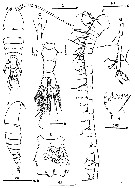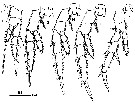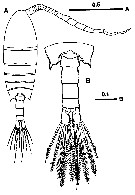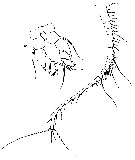|
|
 |
|
Calanoida ( Order ) |
|
|
|
Diaptomoidea ( Superfamily ) |
|
|
|
Centropagidae ( Family ) |
|
|
|
Centropages ( Genus ) |
|
|
| |
Centropages maigo Ohtsuka, Itoh & Mizushima, 2005 (F,M) | |
| | | | | | | Ref.: | | | Ohtsuka & al., 2005 a (p.92, Descr. F,M, figs.F,M) |  issued from : S. Ohtsuka, H. Itoh & T. Mizushima in Plankton Biol. Ecol., 2005, 52 (2). [p.94, Fig.1]. Female (from 35°01'16''N, 138°32'02''E): A-B, habitus (dorsal and lateral, respectively); C, rostrum (anterior view); D, urosome (dorsal); E, Genital compound somite (ventral); F, A1, 1st (I) to 17th (XXI) segments; G, A1, 18th (XXII) to 22nd (XXVI-XXVIII) segments; H, Md (mandibular gnathobase). Scale bars in mm.
|
 issued from : S. Ohtsuka, H. Itoh & T. Mizushima in Plankton Biol. Ecol., 2005, 52 (2). [p.95, Fig.2, A-C]. Female: A, A2; B, Md (mandibular palp); C, Mx1; D, Mx2; E, Mxp. Scale bars in mm.
|
 issued from : S. Ohtsuka, H. Itoh & T. Mizushima in Plankton Biol. Ecol., 2005, 52 (2). [p.95, Fig.2, F-J]. Female: F-J, P1 to P5, respectively (anterior views). Scale bar in mm.
|
 issued from : S. Ohtsuka, H. Itoh & T. Mizushima in Plankton Biol. Ecol., 2005, 52 (2). [p.97, Table 1]. Female: Armature formula of swimming legs P1 to P5. (spines = Roman numerals; setae = Arabic numerals.
|
 issued from : S. Ohtsuka, H. Itoh & T. Mizushima in Plankton Biol. Ecol., 2005, 52 (2). [p.96, Fig.3, A, B]. Male: A, habitus (dorsal); B, 5th pediger segment and urosome (dorsal). Scale bars in mm.
|
 issued from : S. Ohtsuka, H. Itoh & T. Mizushima in Plankton Biol. Ecol., 2005, 52 (2). [p.96, Fig.3, C-F]. Male: C, right A1; D, left P5 (anterior view); E, right P5 (anterior); F, 2nd and 3rd exopodal segments of right P5 (posterior). Scale bars in mm.
| | | | | NZ: | 1 | | |
|
Distribution map of Centropages maigo by geographical zones
|
| | | | Loc: | | | NW Pacif. (Shimizu Port, Suruga Bay, E Middle Japan) | | | | N: | 1 | | | | Lg.: | | | (1080) F: 1,15-1,24; M: 1,04-1,12; {F: 1,15-1,24; M: 1,04-1,12} | | | | Rem.: | Sampling by vertical net from 30m to surface.
For Ohtsuka & al. (2005, p.97) this species belongs to alcoki-group. According to the authors this species can be regarded as the northernmost of the species-group. However, this new species has never been recorded before nor since its discovery in 1979, suggesting that it may not be a natural inhabitant of the region. An possibility is that a temporary pseudo-population extended to Shimizu via the Kuroshio Current extension from the southern populations originally inhabiting tropical/subtropical areas of East Asia. Another possibility is that the new species could have introduced from Indo-West Pacific area via ballast water (Shimizu is an important harbour frequented by many container and bulk ships from all over the world. This sporadic occurrence in Japanese waters suggests that is a native species that is difficult to collect either to its low numbers , a restricted distribution near the surface or bottom, or a limited occurrence in time due to patterns of diapause egg production (see Grice & Marcus, 1981; Madhupratap & al., 1996; Marcus & Lutz, 1998; also see for phytoplankton: S. Ribeiro & al., 2011). | | | Last update : 31/12/2014 | |
|
|
 Any use of this site for a publication will be mentioned with the following reference : Any use of this site for a publication will be mentioned with the following reference :
Razouls C., Desreumaux N., Kouwenberg J. and de Bovée F., 2005-2026. - Biodiversity of Marine Planktonic Copepods (morphology, geographical distribution and biological data). Sorbonne University, CNRS. Available at http://copepodes.obs-banyuls.fr/en [Accessed February 08, 2026] © copyright 2005-2026 Sorbonne University, CNRS
|
|
 |
 |








